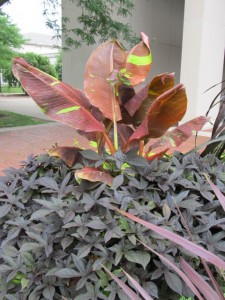There is frost on your pumpkin. By late October, northern U.S. gardeners (USDA zones 3 thru 6) must protect non-hardy tropicals such as cannas (Canna spp.), bananas (Musa spp. and Ensete spp.), elephant ears (Colocasia spp. and Alocasia spp.) and angel trumpets (Brugmansia spp.). Most gardeners living in zone 7-b and further south have little difficulty overwintering most cold sensitive tropicals outdoors.
Cannas (rhizomes) and elephant ears (tuberous roots) should be lifted from garden beds and stored in dry peat moss above freezing over winter. Container plants require winter storage as well. Stems should be cut back to the soil line and soil is shaken away from the root mass. Rhizomes and tuberous roots are stored in dry soil or sphagnum peat moss between 35-45° F.
For angel trumpets and non-hardy bananas, gardeners have two options. Option one is to cutback and bareroot angel trumpets and Musa spp. bananas. Do not cutback single-trunk bananas (Ensete spp.) as you must leave the growing point intact. To induce dormancy, store them in a cool location such as in an unheated garage or cellar (35° F minimum for cannas and 45° F for bananas). Reduce watering to once monthly and stop fertilizing, causing leaves to drop.
Option two for angel trumpets and bananas is to grow them. Angel trumpets and Musa spp. bananas are cutback to 5-6 inch stubs (for space saving) and cared for in a sunroom or greenhouse. Feed them with half-strength house plant brand fertilizer (such as Schultz™, Miracle Gro™ or Hyponex™) at every third watering.


 Posted in
Posted in 
